新概念英语第一册Lesson81-82
新概念英语第一册-Lesson81-82.
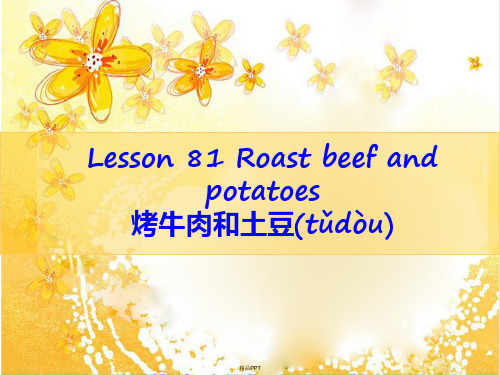
(2)用于指物时,表示可能
性或必然性
Look, it is going to rain.
CAROL: Oh!
瞧,快下雨了。
TOM: What's the matter, Carol?
CAROL: Well, you're going to have roast
beef and potatoes again tonight! 精品PPT
7. have a __c_ig_a_r_e_tt洗e澡
8. have ___b_a_th__ 不得不 /have a shower
to
精品PPT
模仿例句完成一下句子(jù zi),选用drank,enjoyed yourself,are eating,went for,ate 或 take。 Example: I have a cup of coffee. I drank a cup of coffee.
TCAORMO: L:WOeh!__h_a_d__r_o_as_t__b_e_e_f_a_n_d_p_o_t_a_t.oes TOM: What's the matter, Carol? CAROL: Well, you're going to
______________________ again tonight! have roast beef and potatoes
精品PPT
CAROL: Tom!
TOM:Yes? CAROL: Sam's here. TOM: I'm nearly ready.
be ready 做好…的准备(zhǔnbèi) nearly在此处修饰ready ,表示“快好了”
e.g. It’s nearly dead.
新概念英语第一册L81~82

Lesson 81 ~ 82 Roast beef and potatoes◆ 词汇详解(1) bath n. 洗澡区别: have a bath多指盆浴,而take a shower指淋浴e.g. 我想洗个澡。
I want to have a bath.(2) nearly adv. 几乎,将近;差不多;差点儿e.g. The dinner is nearly ready.晚饭马上就好。
e.g. I nearly missed the train.我差点错过火车。
(3) ready adj. 准备好的,完好的词组:be ready to do sth. 准备好做某事;愿意做某事e.g. 你准备好离开了吗?Are you ready to leave?e.g. 雷锋总是乐于助人。
Lei Feng is always ready to help others.(4) dinner n. 正餐,晚餐吃晚饭have dinner扩展:吃早饭/午饭/ 喝茶have breakfast/ lunch/ tea(5) restaurant n. 饭馆,餐馆e.g. 我昨天去了一个中餐馆。
I went to a Chinese restaurant yesterday.(6) roast adj. 烤的烤鸭roast duck 烤牛肉roast beefv. 烤,烘e.g. 我们需要一个炉子来烤肉和马铃薯。
We need an oven to roast meat and potatoes.扩展:煮boil/ 蒸steam / 煎fry/烤(面包)bake / 烧烤barbecue(7) breakfast n. 早饭e.g. 是吃早饭的时候了。
It’s time for breakfast.(8) haircut n. 理发剪头发have a haircut(9) party n. 聚会e.g. 你能来我的生日聚会吗?Can you come to my birthday party?(10) holiday n. 假日暑假/寒假summer/winter holidaye.g. 他正在度假。
新概念英语第一册Lesson81-82笔记(语法点+配套练习+答案)
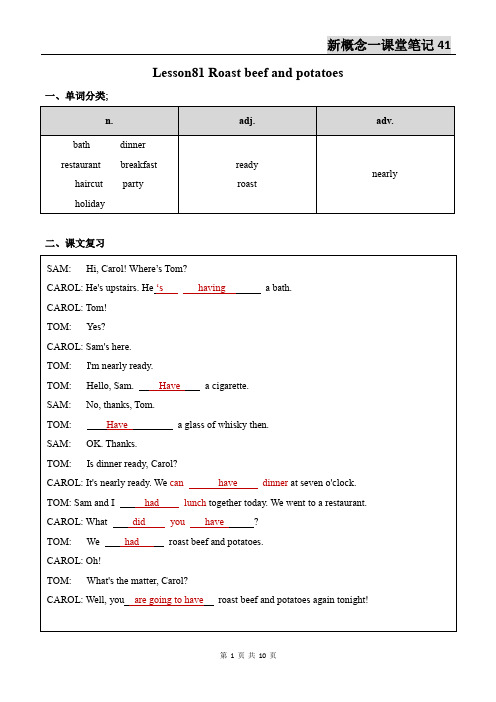
1.Tonyhas(have)a bath every day.(同义句)
=Tony takes a bath every day.
2.Did(do) youtake(take) a bath yesterday?
=Did you have a bath yesterday?
答:Yes, I do. / No, I don’t.
He had many houses.
否:He didn’t have many houses.
疑:Did he have many houses?
答:Yes, he did. / No, he didn’t.
练习三:(适当形式填空)
1.What fruitdoyouhave(have)?
Lesson81 Roast beef and potatoes
1、单词分类;
n.
adj.
adv.
bath dinner
restaurant breakfast
haircut party
holiday
ready
roast
nearly
二、课文复习
三、课文重点
重点
Байду номын сангаас例句
bath n.洗澡
have a bath洗澡
=take a walk
=take a try
=take a look
=take a swim
=take a drink
=take a rest
=take a haircut
练习一:(用have的适当形式填空。)
度假1.have a holiday
2.take a holiday3.go for a holiday
新概念英语第一册 Lesson 81 -- 82讲解和练习

Lesson 81 –82Ⅰ. VOCABULARY1.bath 洗澡(比较正式)take/have a bath 洗澡bathroom 卫生间shower 淋浴,冲凉,比较随意。
2. party1)聚会His mother holds a birthday party for him every year.2)政党the Chinese Communist Party/ CCP 中国共产党3. holiday 假日I spent my holiday in the park.holiday 指节日,纪念日,有时用复数表示假期。
She is away on holiday at present.vacation 指学校或机关正式规定的假期,一般较长,不能只指某个节日Christmas 圣诞节New year’s Day 新年Women’s Day 妇女节Father’s(mother’s) Day Labor Day 劳动节National Day 国庆节4. nearly 几乎,将近与almost意义基本相同如:It’s nearly one o’clock.表示“接近”或者“快要到了”是用nearly,表达“不足”或者“尚差一点”用almost。
I almost fell down. 我几乎倒了。
5. ready 准备好Everything is ready for the party.be/get ready for 做好……的准备We’re ready for a journey.be/get ready to do sth 准备好做……, 愿意做……. I’m ready to go.6. roast 烤过的,烧,烤roast beef/pork/chicken Beijing Roast Duck 北京烤鸭bake 烤(面包,饼)fry 油煎boil 烧开,煮熟Ⅱ. TEXT1.He’s having a bath. 他正在洗澡。
新概念英语第一册Lesson81-82

restaurant
n. 饭馆,餐馆 快餐店 fast food restaurant • 中餐厅 Chinese restaurant
西餐厅
Western restaurant
roast adj. 烤的 B.J. roast duck bake 北京烤鸭
grill n. 烤肉 toast n. 烤面包 barbecue n. 烧烤
New Concept English 1
Lesson 81-82
bath
n. 洗澡,泡澡 have a bath 汤姆正在洗澡。 Tom is having/ taking a bath.
同义:shower 淋浴;阵雨
take a shower have a shower
have a bath 洗澡 have a hot bath take a cold bath
课文讲解 Passage
此外,"potato"一词还可用于指人,生活中我们有 "couch potato"一语,指的是那些整日沉溺于电视的人, 他们坐在沙发上,吃着土豆条(片),眼睛一眨不眨地 盯着电视屏幕,所以此语用来指电视迷,多么形象的描 述! 在社交场合,美国人与别人交谈时,他们常说:"I'm a small potato.",含义是“我只是个小人物,没什么了 不起”,表达一个人的谦虚和涵养。但在公司里,如果 听到老板对员工说:"You are really potato-headed.", 这可就糟了,这是一句批评人的话,含义是“你真是个 傻瓜(笨蛋)。" 不仅如此,口语中美国人还将"potato"一词用于既可指 人也可指物的场合中,如"the clean potato"一语,指 的是最好的人(物);与之意思接近的一语是"quite the potato"(妙不可言的人,非常好的东西)。
新概念英语第一册第81-82课(共21张PPT)

★dinner n. 正餐,晚餐
• three meals a day 一日三餐 • breakfast 早饭 • lunch 午餐 • tea 下午茶 • supper 晚饭 • dinner 正餐 • meal 一顿饭
听第一遍后的提问:
why is Carol disappointed?
听第二遍后的提问:
洗一个澡
have a bath
抽一根烟
have a glass of whisky
喝一杯威士忌Байду номын сангаас
have dinner
吃晚餐
have lunch
吃午餐
have a cigarette
•当have不表示“有”而表示其他意思时,其用法和英语中的 其他动词相同,意即:在疑问和否定结构中,have的一般现 在时和一般过去时形式必须用do,does和 did:
Grammar in use
完全动词have(3)
Have可以代替常用动词,表示eat, enjoy, experience, drink, take等意义。这时的have是行为动词,所以与动作有关, 而不像 have表示“具有”时(请参见 Lessons 59~60语 法部分)那样表示状态(如 I have/get a car)。因此,它 可以用于各种时态。
ready adj.
• (1)准备就绪的: • Dinner will be ready in 20 minutes. • 20分钟后就可以开饭了。 • Are you ready to leave? • 你是不是准备好这就可以动身了? • (2)预先准备好的;立即可得到的: • The apples are ripe and ready to eat. • 苹果完全熟了,随时可以享用。 • We must get the house ready for our guests. • 我们必须把房子收拾停当,以期我们的客人随时入住。 • (3)快的,立即的: • He gave a ready consent. • 他立即爽快地表示同意。 • This new system gives users readier access to the data. • 这个新系统可以使用户们更快捷地进入数据库。
(完整word版)新概念英语第一册lesson 81-82
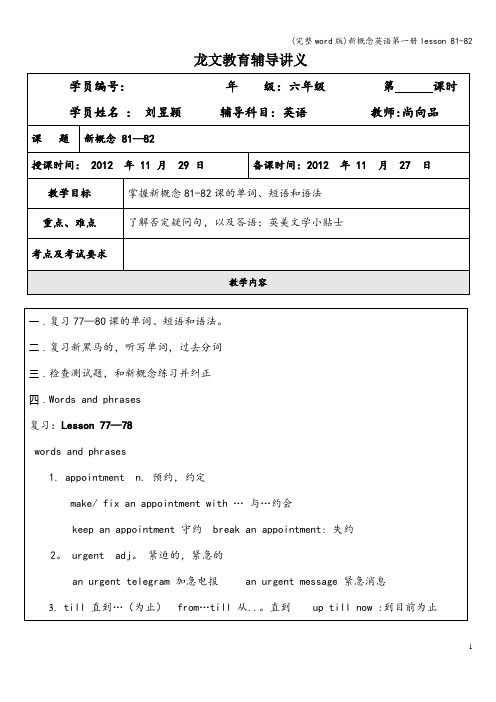
表示惊异、反问、责难等语气时通常用否定疑问句,且通常意为“难道…不…”
【结构】⊙↖↗⊙ 在正式文体中,用句型“be/助动词/情态动词+主语+ not + 其他"实际上结构是在一般疑问句的主语后面加not(不与任何词缩写)构成,例如:
Did you not know? 难道你不知道吗?
3.You are going to have roast beef and potatoes again tonight.
Be going to 是一般将来时的基本结构之一
【重点】一、be going to 的用法点拨 :be going to 是一种固定结构,它后面要接动词原形。含有be going to 结构的句子中往往有表示将来的时间状语,如:tomorrow, next week等。
3。 breakfast 早餐 at breakfast 早餐时; 正在进行早餐have( take) breakfast 用早餐
4.party 聚会,政党 join the party 入党
5。 holiday 假期,假日on holiday:在休假中; take a holiday 休假
Sentences:
be going to 结构中的助动词be很少用原形,be随主语人称和数的变化而变化,它一般有三种形式,am , is , are 。而going to 固定不变.即:当主语是 I 时用am ;当主语是第三人称单数时用is;当主语是其他人称时用are。
I am going to buy something tomorrow morning.明天早上我要去买些东西。
Sentences
1.I'm making a shopping list
新概念第一册Lesson81-82

25
Note on the text
1.having a bath 洗澡 have a hot bath take a cold bath 拓展: bath-tub = tub bathing-cap bathrobe = robe dressing – gown
澡盆;浴缸 泳帽 浴衣(Br.) 睡袍(U.S.)
烤箱里正烤着牛肉.
(3) n. 烤肉 Here are some roasts for you. 这有一些烤肉给你。 Beijing Roast Duck 北京烤鸭
Listen,Read and answer questions
Why is Carol disappointed?
Language Points
bath & shower的区别:
bath “洗澡”,比较正式; shower “沐浴,冲凉”,比较随意。 She likes warm bath. People take showers very often in the summer.
2.have a cigarette 请抽烟
have的用法 1)have译为“有,拥有”时, 它的疑问和否定形式有两种: (1)用助动词引导 (2)由have本身引导
It’s nearly one o’clock. 将近1点了。 She is nearly fifty now. 她将近五十岁了。
nearly与almost的区别: 二者都表示“几乎、差不多”, 但是当要表示“接近”或“就要 到 了”时多用nearly; 当想表达“不足”或“尚差 一点 时”最好用almost。
1. They had a meal at a restaurant. They _______ a meal at a restaurant. 2. We had a holiday last month. We _______ a holiday last month. 3, Have a biscuit. _______ a biscuit. 4. You have a good time. You _______. 5. They are having their lunch. They _______ their lunch. 6. I had a glass of milk. I _______ a glass of milk.
新概念英语第一册自学笔记含课后练习答案:Lesson 81-82
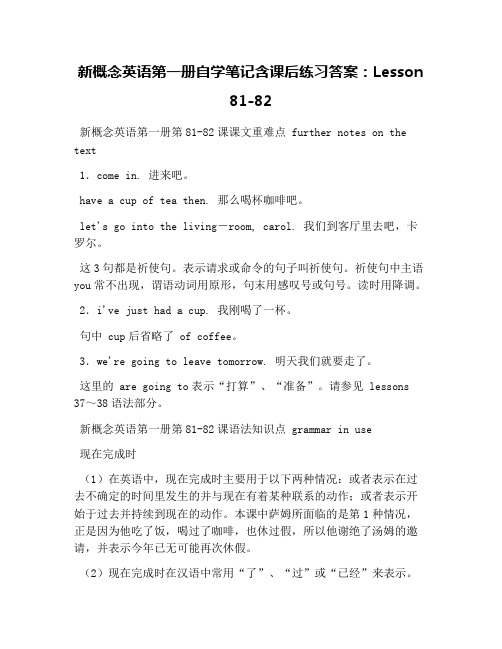
新概念英语第一册自学笔记含课后练习答案:Lesson81-82新概念英语第一册第81-82课课文重难点 further notes on the text1.come in. 进来吧。
have a cup of tea then. 那么喝杯咖啡吧。
let's go into the living-room, carol. 我们到客厅里去吧,卡罗尔。
这3句都是祈使句。
表示请求或命令的句子叫祈使句。
祈使句中主语you常不出现,谓语动词用原形,句末用感叹号或句号。
读时用降调。
2.i've just had a cup. 我刚喝了一杯。
句中 cup后省略了 of coffee。
3.we're going to leave tomorrow. 明天我们就要走了。
这里的 are going to表示“打算”、“准备”。
请参见 lessons 37~38语法部分。
新概念英语第一册第81-82课语法知识点 grammar in use现在完成时(1)在英语中,现在完成时主要用于以下两种情况:或者表示在过去不确定的时间里发生的并与现在有着某种联系的动作;或者表示开始于过去并持续到现在的动作。
本课中萨姆所面临的是第1种情况,正是因为他吃了饭,喝过了咖啡,也休过假,所以他谢绝了汤姆的邀请,并表示今年已无可能再次休假。
(2)现在完成时在汉语中常用“了”、“过”或“已经”来表示。
(3)现在完成时由 have/has+ 过去分词构成,单数第 3人称用has,其他人称皆用have。
规则动词的过去分词与过去式相同,而不规则动词的过去分词则无统一的规律可言,需特别加以记忆。
(4)一般现在完成时通常与表示不确定的时间副词或短语连用如just, already, before, never, ever, twice, three times等。
新概念英语第一册第81-82课词汇学习 word study1. leave v.(1)离开,出发:the train is going to leave in 5 minutes. 火车将于5分钟后开出。
新概念英语第一册Lesson81-82 课件

Lesson 81-82 RoRaosatstbbeeeeff &andpoptoattaoteoess
Everyday English
1.Small potato. 小人物,小角色,无关重要的人 2.Big shot. 大人物,大亨 3.Seeing is believing. 眼见为真,不相信传言
2.( B ) We haven’t got tea ____ juice .
A. and B. or C. but
3. (B ) I haven’t got some honey. I haven’t got
some butter ,_______.
A. and B. either C. too
4. (B ) He hasn’t got _____ coffee.
/’hεəkʌt/ /’brekfəst/
a lot of, many 和much, some和any 的用法 1.a lot of 许多,大量的。既可修饰可数名词又可以修饰 不可数名词。但主要用于肯定句中。 We have a lot of things to do. 2.many/ much 许多(数量少于a lot of)many 修饰可数 名词,much 修饰不可数名词
A.lot of B.much C.a lot of D.a lot
(D )6.We can ____dinner ____six o’clock.
A.have,in B.has, at C.had, in D.have, at
(A )7.They had a meal____the restaurant yesterday evenin
食品杂货 文具 报刊零售人 药剂师 文具店 食品店 蔬菜水果店 肉店 报刊零售店 面包店 药店
新概念英语第一册Lesson 81-82自学导读

新概念英语第一册Lesson 81-82自学导读课文详注 Further notes on the text1.No, thanks, Tom. 不,谢谢,汤姆。
在别人请你吃东西时,如果你吃,就说Ok, thanks/Oh, thank you。
如果你不吃,则说No, thanks。
2. Oh! 噢!是感叹词,在这里表示惊讶。
3.Well, you're going to have roast beef and potatoes again tonight! 唉,今晚你们又要吃烤牛肉和土豆了!是陈述句形式的感叹句。
这里的well可理解为感叹词,表示惊讶。
语法 Grammar in use完全动词have(3)have可以代替常用动词,表示eat, enjoy, experience, drink, take等意义。
这时的have是行为动词,所以与动作有关,而不像 have表示"具有"时(请参见第59-60课_Is that all?语法部分)那样表示状态(如 I have〈got〉a car)。
因此,它可以用于各种时态。
如:Have a cigarette!抽根烟吧!I'm having a drink.我在喝酒。
We had lunch together today.我们今天一起吃了午饭。
当have不表示"有"而表示其他意思时,其用法和英语中的其他动词相同,意即:在疑问和否定结构中,have的一般现在时和一般过去时形式必须用do,does和 did:Do you have milk in your tea?你喝茶加牛奶吗?I don’t have milk in my tea.我喝茶不加牛奶。
Did you have a nice holiday?你的假日过得愉快吗?I didn’t have a nice holiday.我的假日过得不愉快。
新概念英语第一册Lesson81-82(课堂PPT)
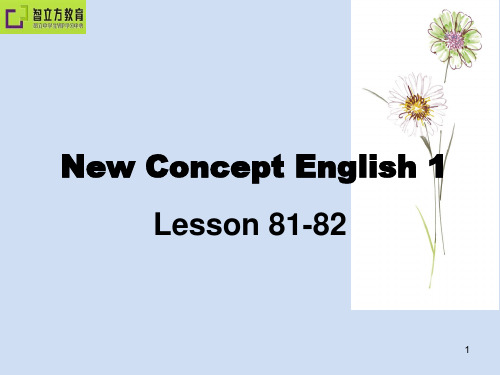
• 我差点就错过了火车 I nearly missed the train. ② v. 极;密切地
• The matter concerns us nearly. 这事与我们有切身关系。
17
单词教授 New Words
18
单词教授 New Words
★dinner n. 正餐,晚餐 • three meals a day 一日三餐 • breakfast 早饭 • lunch 午餐 • tea 下午茶 • supper 晚饭 • dinner 正餐 • meal 一顿饭
19
单词教授 New Words
C Western restaurant
20
Tips: Breakfast to eat well. Lunch to eat satisfied. Dinner to eat less
13
开心一刻
14
单词教授 New Words
15
单词教授 New Words
16
单词教授 New Words
★nearly adv. 几乎,将近 ① v. 几乎;差不多;差点儿
New Concept English 1 Lesson 81-82
1
Do you like
eating?
2
• Eating is very important!
3
Warm-up
奥巴马访华时对胡总说:“我终 于明白了中国的文化其实就是吃文化。 比如谋生叫糊口,岗位叫饭碗,受雇 叫混饭,花积蓄叫吃老本,混得好叫 吃得开,占女人便宜叫吃豆腐,女人 漂亮叫秀色可餐,女人多了叫吃不消, 受人欢迎叫吃香,受到照顾叫吃小灶, 受人伤害叫吃亏,男女嫉妒叫吃醋, 犹豫不决叫吃不准,不能胜任叫干什 么吃的,负不起责任叫吃不了兜着走, 办事不力叫吃干饭的。”胡总听后很 生气:“我们应该好好总结一下中美 关系!你却来总结中国文化,是不是 吃多了?!”
- 1、下载文档前请自行甄别文档内容的完整性,平台不提供额外的编辑、内容补充、找答案等附加服务。
- 2、"仅部分预览"的文档,不可在线预览部分如存在完整性等问题,可反馈申请退款(可完整预览的文档不适用该条件!)。
- 3、如文档侵犯您的权益,请联系客服反馈,我们会尽快为您处理(人工客服工作时间:9:00-18:30)。
• Repeat the dialogue together.
Revision
Grammar 语法
例题1:--你有奶酪吗? --Have you got any cheese? --你必须去食品店去买一些奶酪。 --You must go to the grocer’s to get some cheese. 例题2:--你有杂志吗? --Have you got any magazines? --你必须去报刊零售处去买一些杂志。 --You must go to the newsagent’s to get some magazines.
单词教授 New Words
make holiday度假 be on holiday在度假 go on holiday去度假 take a holiday休假
语法讲解 Grammar in use
1.have译为“有,拥有” 时,它的疑问和否定形式 有两种: (1)用助动词引导 (2)由have本身引导
总结 Conclusion
课文 Retell the text
• 重点单词 • 重点词组 • 重点句型
综合练习 Exercise
选择题
• ( )l. Sit down and ____ a cup of coffee, please. • A. have B. had C. having D. has • ( ) 2. A:What's the matter____ your car? • B : It doesn’t work. • A. in B. for C. with D. of • ( )3. I____ the boys in the garden just now. • A. saw B. have seen C. see D. am seeing . • ( )4. A: What____ you have____ dinner yesterday? • B: Roast beef and potatoes. • A. did; for B. do, in C. did; in D. do; for • ( )5. Tom is busy ____ the exam. • A_to, get ready to B. to get ready for • C. getting ready to D. getting ready for
have
单词教授 New Words
3. party/’pɑ:tI/ n.聚会;政党
(1)join the party入党 (2)a party member党员 (3)a party of一群,一伙
单词教授 New Words
4. holiday/’hDlədI/ /’hDlIdI/ n.假日 summer holiday winter holiday
待我长发及腰, 哥, 娶我不!?
单词教授 New Words
• 2. breakfast/’brekfəst/ • n.早饭 • at breakfast
• 早餐时,正在进早餐 • break up 分手
单词教授 New Words
breakfast早餐 lunch午餐 brunch早中餐 supper晚饭 dinner晚餐(较丰盛)
1. Where is Tom? where 为特殊疑问代词,引导特殊疑问句 e.g. Where is he from? Where does Cheery live?
课文讲解 Passage
CAROL: Tom! TOM:Yes? CAROL: Sam's here. TOM: I'm nearly ready. be ready 做好…的准备 nearly在此处修饰ready ,表示“快好 了” e.g. It’s nearly dead.
New Concept English 1 Lesson 81-82
Do you like eating?
• Eating is very important!
Warm-up
奥巴马访华时对胡总说:“我终 于明白了中国的文化其实就是吃文化。 比如谋生叫糊口,岗位叫饭碗,受雇 叫混饭,花积蓄叫吃老本,混得好叫 吃得开,占女人便宜叫吃豆腐,女人 漂亮叫秀色可餐,女人多了叫吃不消, 受人欢迎叫吃香,受到照顾叫吃小灶, 受人伤害叫吃亏,男女嫉妒叫吃醋, 犹豫不决叫吃不准,不能胜任叫干什 么吃的,负不起责任叫吃不了兜着走, 办事不力叫吃干饭的。”胡总听后很 生气:“我们应该好好总结一下中美 关系!你却来总结中国文化,是不是 吃多了?!”
e.g. I have a house in town. I haven’t (got) a house in town. I don’t have a house in town.
语法讲解 Grammar in use
2.have译为“进行,从事”时,和名词或名词短语 构成短语。它的疑问和否定形式只能由助动词引导。 可以代替常用动词如:eat,enjoy,drink , take等 e.g. have a bath洗澡 have a drink喝酒 have a holiday度假 have a look看一下 have a cigarette抽支烟 have a try试一下 have a break休息一下 have a talk谈一谈
•So you must be careful with your diet!
课文导入 Lead in
Tips: Breakfast to eat well. Lunch to eat satisfied. Dinner to eat less
开心一刻
单词教授 New Words
单词教授 New Words
C Western restaurant
单词教授 New Words
baker bake v.
单词复习测试
洗澡 几乎 准备好的 正餐,晚餐 饭馆 烤的 早饭 理发 聚会 假日
bath almost ready dinner restaurant roast breakfast haircut party holiday
课文讲解 Passage
此外,"potato"一词还可用于指人,生活中我们有 "couch potato"一语,指的是那些整日沉溺于电视的人, 他们坐在沙发上,吃着土豆条(片),眼睛一眨不眨地 盯着电视屏幕,所以此语用来指电视迷,多么形象的描 述! 在社交场合,美国人与别人交谈时,他们常说:"I'm a small potato.",含义是“我只是个小人物,没什么了 不起”,表达一个人的谦虚和涵养。但在公司里,如果 听到老板对员工说:"You are really potato-headed.", 这可就糟了,这是一句批评人的话,含义是“你真是个 傻瓜(笨蛋)。" 不仅如此,口语中美国人还将"potato"一词用于既可指 人也可指物的场合中,如"the clean potato"一语,指 的是最好的人(物);与之意思接近的一语是"quite the potato"(妙不可言的人,非常好的东西)。
单词教授 New Words
单词教授 New Words
★dinner n. 正餐,晚餐 • three meals a day 一日三餐 • breakfast 早饭 • lunch 午餐 • tea 下午茶 • supper 晚饭 • dinner 正餐 • meal 一顿饭
单词教授 New Words
课文讲解 Passage
TOM: Is dinner ready, Carol? CAROL: It's nearly ready. We can have dinner at seven o'clock. TOM: Sam and I had lunch together today. We went to a restaurant. CAROL: What did you have? TOM: We had roast beef and potatoes.
Revision
• • • • • • • • • • • • 购物 蔬菜 希望 钱 需要 药剂师 事情 单子 食品杂货 水果 文具 报刊零售人 shopping vegetable hope money need chemist thing list groceries fruit stationery newsagent
一个五成熟的牛肉和 一个八成熟的牛肉走在路上 为什么不讲话? 因为不熟 牛少了一个角会怎么样? 变成犀牛
课文讲解 Passage
美国人很喜欢吃土豆,而且还有多种吃法, 其中比较受美国人欢迎的吃法是炸薯条 (fried potato)和炸薯片(potato crisp), 这在美国各地城市大街上比比皆是的快餐 店中,如麦当劳(McDonald's),肯德基 (Kentucky)里等可以说是一种老少皆宜的 休闲食品。 美国人还将整个土豆烤着吃(baked potato),对于刚刚烤出的热气腾腾的土豆 (hot potato),拿起来烫手,使人很想立 即将其扔掉,于是源自于日常生活的这一 妙语——"hot potato"便引申用于指那些 棘手的问题或难以处理的局面。
课文讲解 Passage
课文讲解 Passage
SAM: Hi, Carol! Where's Tom? CAROL: He's upstairs He's having a bath.
翻译一下?go/walk/run upstairs 猜一猜?stairs, upstairs, downstairs
Revision
Check the answer to the exercises: Lesson 80( P-164)
